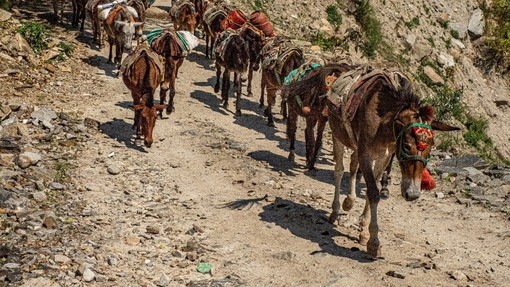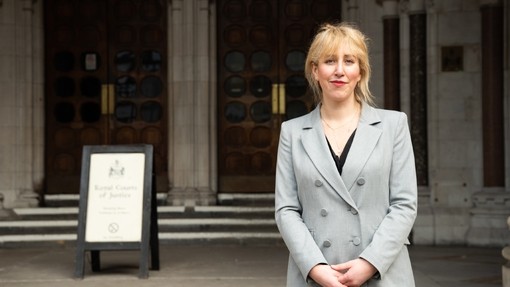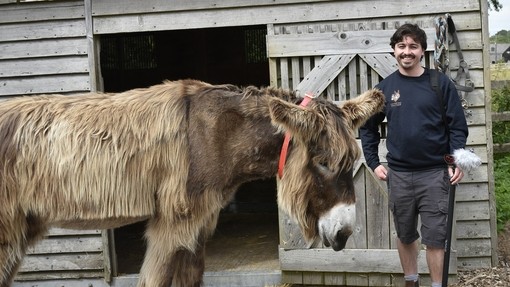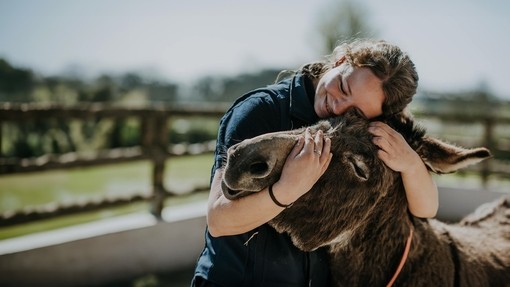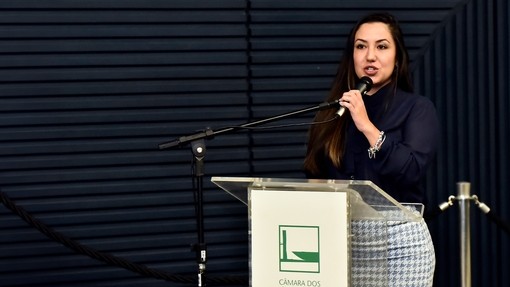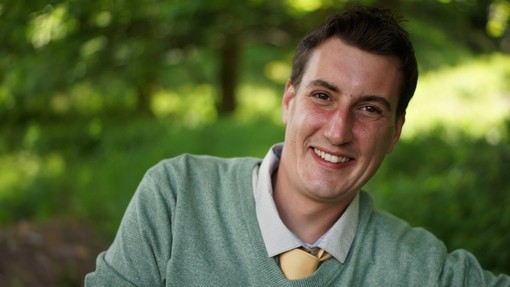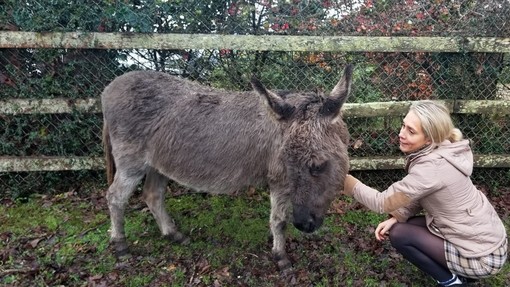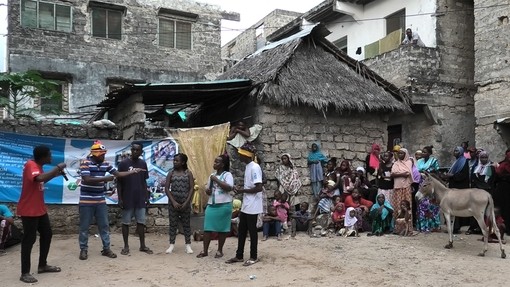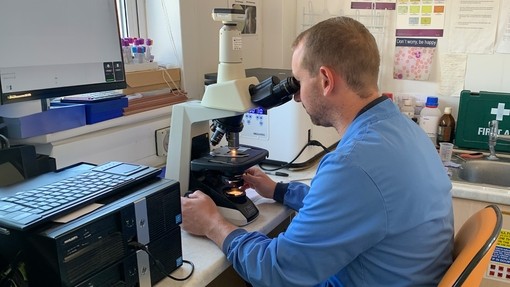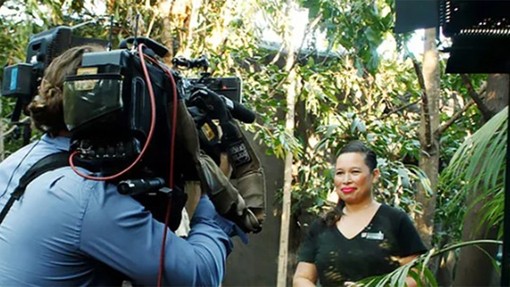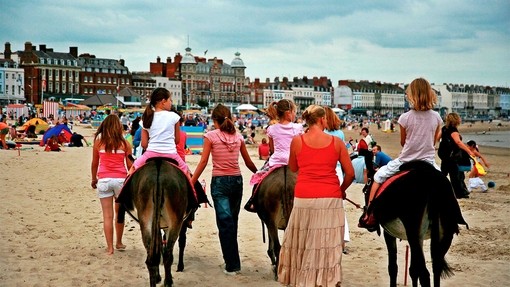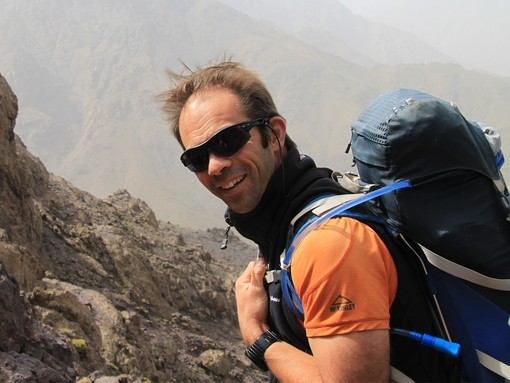
Glen's story
Dr Glen Cousquer is an environmental educator, systems thinker, awareness-based systems change practitioner and former vet, who supports others to open up their perspectives on the interactions between humans, the more than human and our wider environment. We talked to him to find out more…
Can you tell us about yourself?
I find describing myself a challenge. I reject labels and categories; they are so limiting. I’m increasingly borrowing from our friends the mules, describing myself as a hybrid wearing many hats! The notion of a hybrid person in our personal and professional lives is about integrating different influences and different strands.
My undergraduate training was in physiology, then veterinary medicine. After about 10 years of working in the veterinary world, particularly in wildlife work, I retrained and became an education professional. That led me to working with The Donkey Sanctuary for 10 years on working equid welfare, with a particular focus on the manifestations of welfare in the mountain tourism industry in Morocco.
I was taking school groups and tourists into the mountains and getting very interested in how we journey through the mountains. We can understand journeying literally, but also metaphorically in that we are pilgrims through life. We are trying to make sense of life as this relational process. What I do, it’s an ongoing process of self-learning, but then sharing and supporting other people in that exploration.
A job came up at The University of Edinburgh at the Royal (Dick) Vet School to lecture and coordinate two MSc programmes in Conservation Science and One Health, which are very interdisciplinary. In this role, I’ve been trying to influence the teaching and move it into a more integrated approach. One part is a real shift from ego to eco, so much more emphasis on systems thinking and awareness.
I think most people assume that science is objective. That as a fantasy was blown out of the water decades ago, but it still persists in the biomedical world. Historically we’ve had dualism where we think there’s a real world out there that we can study, and there’s an inner world of perceptions that we can study. So we can either have an objective or subjective data focus for research.
The social scientists do that subjective stuff, hard scientists do the objective stuff. It’s just complete baloney. The nature of the world is the ongoing, relational, unfolding co-production that arises when inner and outer worlds meet. As soon as you realise that the only reality is the one we create in any given moment, then there’s this third way that opens up where the quality of our presence in the world determines whatever follows.
What made you want to become a vet in the first place?
Growing up in the 70s and 80s I loved wildlife and wild places. Doing my A-levels in the early 90s, there was this pressure to decide what to do with your life - you should study the sciences, become a professional and that takes over.
There’s a disconnect between that, and being fascinated by the awe and wonder of the natural world. The fascination leads you to gravitate towards opportunities for working with the more than human world. I think it’s fair to say that most vets, through their training, lose their souls. They become incredible technicians and very knowledgeable but around a narrow view of the world.
It’s not possible to step out of the system where animals are owned or raised for food. There’s a particular way of studying them that is analytical and focused. It denies us, unless we’re really good at preserving it, all that wonder, and the fullness, richness and sacredness of life itself.
One of the things that I’m really keen to see is a shift away from explicit knowledge. The problem with veterinary education is it privileges, for very good reason, explicit and technical knowledge. And so you end up with technicians who are able to look at an individual patient, diagnose and then treat what appears to be their presenting problem. As soon as you take that frame away and you actually look at this in a much bigger context, the sufficiency of those ways of knowing becomes very questionable.
How does your veterinary training inform your current work?
Immersion in a place provides a depth of knowledge that is much more contextual and I can keep drawing on. I’m very happy not to be practising because I find that too big a compromise, but that depth of experience will keep animating my work.
A very small example is when I gave a lecture at the Edinburgh Futures Institute on the intersections between biodiversity and mental health. I did it all through poetry.
I was exploring entanglements through the inspiration of the swift. They are one of the most incredible species on this planet - and every time they come to ground they meet us humans, our pollution and our craziness, and often come to grief.
I drew on clinical knowledge, then related it to trauma studies, grief work and alternative ways of knowing the natural world. The comment made afterwards by a linguistic scholar was that they would never have been able to carry off that poetry themselves, because I integrated different clinical cases in there as well.
What did your work in Morocco involve?
My first MSc was in outdoor education. For my dissertation, I decided to develop a curriculum for the Mountain Guide Training School in Morocco. I shared the idea with Stephen Blakeway, then the director of the international programme at The Donkey Sanctuary. He recognised and appreciated the systems thinking and the underlying strategy, so for five years, we delivered a training programme until the guide school closed.
After that, in my PhD work, I worked with the wider mountain tourism industry that the guides had gone to work in. I was working with the international trekking companies and their local ground handlers to evolve mule relationships. But it was their understanding of the mule handlers too, because historically the muleteers had always been marginalised. That was the focus for about 10 years of my life.
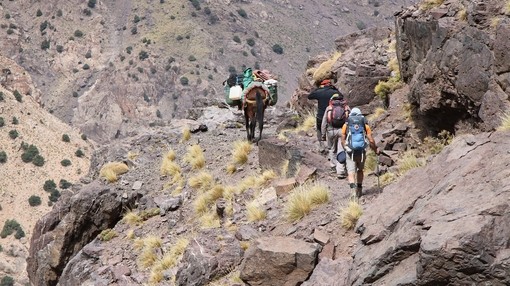
How did this work in practice?
Particularly when I was doing the PhD, I was living in communities. I was seeing every aspect of the relational practices and processes that mules are part of, both in the day to day and when they go off to work in the tourism sector. There is a tension that if you’re wanting to travel on foot, to slow down, be more present, connect to a place and people, that’s made possible by the load being carried by pack animals.
There’s an ethical question about the wider responsibilities to those creatures. The journey becomes possible as a result of their skills and abilities. There’s hidden welfare issues there.
I use film to facilitate reviewing and feedback work. On training treks, you film throughout the day, then edit a review film to share with the group in the evening. You start to see how they interpret situations and the assumptions they bring in. You can reflect back their assumptions. You’re developing deeper insights through this reviewing process.
I remember one of the guys I was interviewing, he was very clear that his mule was lazy, didn’t want to go to work and was not a nice character. When I asked his wife what she thought, she said, “Oh, he’s very easy. I have no trouble with him at all.”
The only interaction the husband had with the mule was to take the mule to work. There’s this filter that determines who that person was seeing when they looked at the mule.
What can mules teach us about systems thinking?
Mules are incredibly gifted creatures. I’m very grateful to them as thinking partners. I think one of the things that they are very good at doing is refusing. And a key aspect of systems thinking is that the first move is always to suspend. By suspending, we break the habit of what we’re used to paying attention to. As soon as you suspend, you can then redirect.
The mule refusing and going, “Do you know what? I haven’t said yes or no yet. I’m buying myself time and space to consider things more carefully.”, it can be disruptive. You’re forging ahead with your own interpretation, and suddenly you’re pulled back because they can stop you in their tracks. You have this opportunity to reevaluate.
Your approach goes much deeper than ‘behaviour’. Can you explain why?
I am uncomfortable whenever we focus on behaviour, because we lose sight of the deeper awareness of the nervous systems as they interface and interact with the world. Behaviour happens as a result of these interactions.
If we’re not working at this deeper level, attuned to how we are in the moment, if we’re not aware of our thoughts, feelings, impulses and how these are modulated by the sympathetic and parasympathetic nervous systems, if that’s not part of the conversation, then we’re talking about something “after the horse has bolted”. It’s already cantering down the road and we’re talking about the behaviour. There’s so much that happens upstream and that’s my focus. I’ve really moved to awareness-based systems change, not behaviour change. I’m interested in root causes.
You see it in schools where people with ADHD are said to have ‘behaviour problems’ and we lose sight of the impact of the environment and culture on our nervous systems. This is why I like Gabor Maté’s work - we need to be better able to recognise that most of the things we see in the world are actually completely normal responses to abnormal situations, but we see them as completely abnormal responses to normal situations.
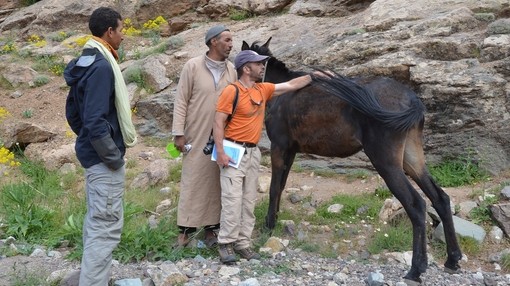
Who do you consider to be your audience for your work?
I’m keen to see a re-enchantment with the world and my audience is the disenchanted. People who know that the world is a disappointment and that there is something really important that we’ve lost. They feel that loss. They are probably grieving that loss, but they don’t necessarily understand it. So those who are feeling this are waking up to a form of betrayal. We’ve essentially created a world of consumers and we’ve lost our sense of being co-citizens of the world.
There are a growing number of people working in the working equine world who are embracing a more holistic multi-species approach. I’ve had the pleasure of working with such people and even supervising their dissertations. It’s nice to see that there are people with these common values and interests, a family of alumni and thinkers. This family is also the audience for my work.
Find out more about Glen and his work
View his profileShare this page
Tags
- Blog

